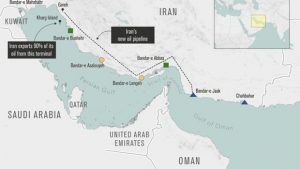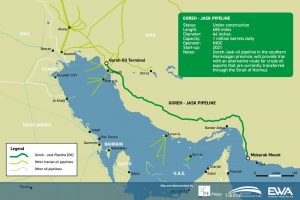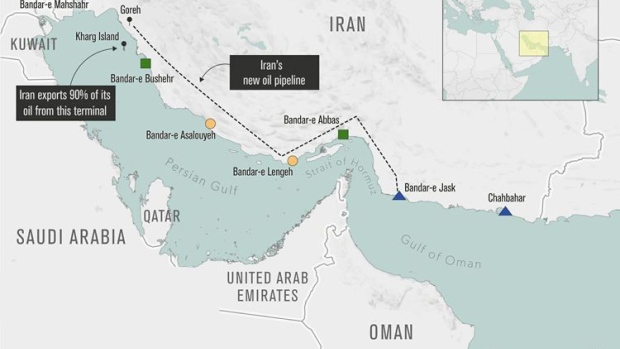
Iran officially ordered the inauguration of a strategic crude oil transfer project in 2021, through which the country will bypass the Strait of Hurmuz and cut reliance on the chokepoint for its oil trades in the future.
Goreh-Jask pipeline project provides Iran with an alternative route for the country’s crude oil exports that are currently carried out through the Strait of Hormuz. The pipeline will open a new gate for Iranian oil to the Indian Ocean by transferring it from Goreh in southwestern Bushehr Province to Jask on the shores of Oman Gulf.
The strategic Strait of Hormuz
The Strait of Hormuz, located between Oman and Iran, is a critical gateway for the global oil industry. According to the U.S. Energy Information Administration (EIA), in 2018, over 21 percent of the world’s oil supply and over a quarter of global liquefied natural gas was flowing through this narrow sea channel.
The strait which connects the Persian Gulf with the Gulf of Oman and the Arabian Sea, is the world’s most important oil chokepoint because of the large volumes of crude oil that flow through the strait.
The EIA defines a chokepoint as a narrow channel along widely used global sea routes that are critical to energy security.
The disruption in oil transit through a major chokepoint, even temporarily, can lead to substantial supply delays and higher shipping costs, resulting in higher world energy prices. Although most chokepoints can be bypassed using other routes, bypassing can add significantly to transit time and costs and some chokepoints have no practical alternatives.
There are limited options to bypass the Strait of Hormuz, and so far only Saudi Arabia and the United Arab Emirates (UAE) had pipelines for shipping their crude oil outside the Persian Gulf circumventing the Strait of Hormuz.
Now Iran has also established its own strategic pipeline for bypassing the strait. With the full operation of the Goreh-Jask pipeline the country will be able to transfer one million barrels per day (bpd) of oil without the need for using the strategic Strait of Hormuz.
This will give Iran a huge advantage over other Persian Gulf Nations and also over the U.S. which have constantly used this chokepoint to pressure the Islamic Republic and negatively affect the country’s oil transactions.
Other benefits of the pipeline
According to the Iranian Oil Minister Bijan Namdar Zanganeh, the new pipeline plays an important role in the Iranian oil industry as the country has officially commenced the export of crude oil from the Makran region.
This project will create employment for 10,000 people and ensures economic development in the Makran region.
The pipeline project has currently a capacity of transferring 300,000 bpd and this capacity will gradually increase to one million barrels in the near future.
Constructed with about $2 billion of investment, Goreh-Jask project also aims to ensure continued oil exports, decentralization of export terminals and diversification of oil export centers, sustainable development, and job creation on the shores of Makran.
The important features of the project
One of the most important features of this national project is the maximum use of domestic capacities and capabilities; more than 90 percent of the goods and equipment used in the implementation of the pipeline project are provided by Iranian contractors and manufacturers.
Some 250 contractors and domestic manufacturers have participated in the project’s implementation; many of the equipment and items used in the project were manufactured domestically for the first time in the country.
Back in December 2020, Touraj Dehqani, the managing director of Petroleum Engineering and Development Company (PEDEC) had announced that the implementation of Goreh-Jask project by domestic contractors had saved the country over €500 million.
Another notable feature that stands out in this national plan is building about 1,000 kilometers of crude oil transmission pipeline and putting it into operation in less than two years, with full reliance on domestic capabilities.

Reference: www.tehrantimes.com

